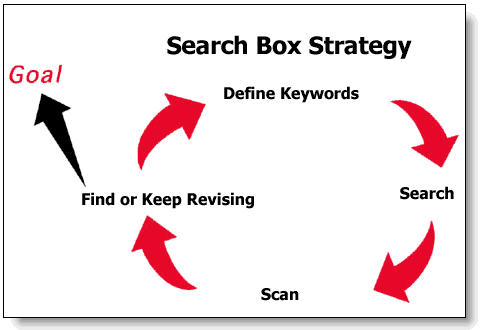Search box Strategy
Tutorial DirectorySuccessful searchers apply strategies with disciplined focus. Using a search strategy is the difference between browsing the Internet and searching the Internet. A searcher who uses a systematic approach called the Search Box Strategy, enters keywords in the search box, looks at the results, and continue the process until finding the desired information.

Refining Your Strategies
Searchers who have refined the Search Box Strategy will carefully choose keywords, do a preliminary search, scan the results for clues, and persistently revise search terms until they find what they seek. You can become a power searcher by practicing this strategy.
The Search Box Strategy is a Matching Game.
Search engines use robotic programs (spyders) to crawl Web pages on the Internet. These bots help create an indexed database of the words on each page they visit. When you enter words in the search box, the search engine checks its database index for a match. The pages listed in the results contain matches for your words.

Match Game - Step by Step
- Enter the words you predict will be in the documents you seek
- The search engine retrieves Web pages in its database that match your words
- Skim (review) the search results to see if you find the desired information
- If the results aren't right, revise your words and try again
Persistence Pays!
It's very possible you won't use effective right word combinations on the first try. When that happens, gather clues from the search results and revise accordingly. Refining your search terms is the essence of the Search Box Strategy!
Convert Your Questions to Queries
Once you understand the combination lock concept of matching keywords and the content you seek, you can take your Search Box Strategy to the next level. Search engines like Google are 'forgiving' and will match words that don't match exactly. But there are still plenty of traditional search engines that rely on EXACT word matching.
Keywords are not all the same

The keywords in bold are the meaningful terms in this natural language question. These are the words most likely to match information in the Web pages you seek. Google processes natural language questions in the search box, but keeping keywords to a minimum is a smart strategy. Otherwise the search engine is looking for all the words you use. An effective query for the question above is: animals danger extinct. (or, animals endangered)
Search engines like Google automatically skip unimportant words entered in the search box. Words that are automatically skipped used to be called stopwords. Here are just a few of the most common stopwords:

Search engines are faster than they used to be. Some may no longer need to exclude stopwords to deliver fast results. Just in case, it saves time not to type complete sentences or questions in the search box and eliminates including words not needed. Make a habit of removing stopwords from queries.
Power Up Your Search Box Strategy
- Eliminate stopwords from your queries
- Build queries with keywords likely to match exactly the information you are looking for
- Enter at least two but no more than six of those keywords in the search box
- View the results and refine your search if necessary. One result for the query ANIMAL DANGER EXTINCT is shown below. Note the new word SPECIES that shows up!

The 1 in 5 Principle - Are you feeling Lucky?

The goal is to use an effective combination of keywords ALL of which are included in the documents you seek. But it's not that easy. Different authors use different words to describe the same thing. According to psychology and experience, the odds of choosing exactly the same concept word as a Web page author are only 1 in 5. Expect to revise challenging queries multiple times before finding the information you want.
Make a Revision Decision
If you don't find what you are looking for, revise your keyword combination. Most revision decisions involve adding or substituting keywords. The easiest place to look for better keywords is the results page of an unsuccessful search. Scan the summaries (also known as snippets) to find new keywords for your next query. Look for scientific vocabulary, new combinations and synonyms to improve the search. The animal extinction search is not a difficult search and answers are easy to locate.
Power Searching
Remember, each time you use Search Box Strategy, you cycle through a process trying to improve your query with better keywords. An effective query is the shortest effective combination of keywords (and sometimes operators as well) that retrieves exactly the information you seek.
Authored by Dennis O'Connor 2003-2004 | Revised 2015